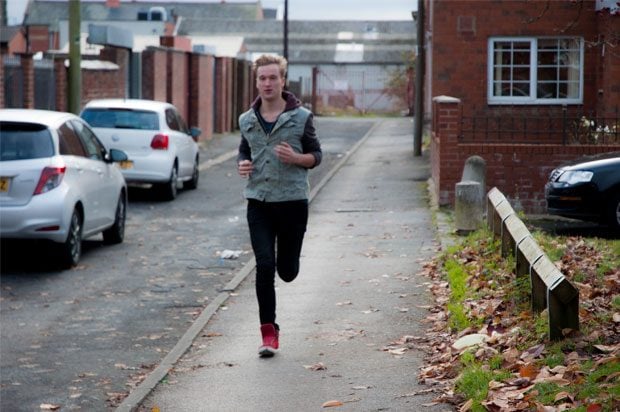How much exercise should I be doing?
Getting fit can feel like an uphill struggle, but we've got some tips to make getting up and out more bearable.

Being fit means you can get to the chippy quicker.
The recommended amount of exercise depends on your age.
If you’re over 19 you should aim to do either two hours and 30 minutes of moderate aerobic exercise (like cycling or walking fast) or one hour and 15 minutes of vigorous aerobic exercise (like dancing, aerobics, running or football) every week. And work on your muscles at least twice a week; lifting weights, push-ups, sit-ups or yoga all build up muscle.
If you’re under 19 you should be doing an hour of exercise every day, and a mixture of moderate aerobic exercise, vigorous aerobic exercise, and muscle-strengthening.
It sounds like a lot – but don’t panic! Start small and build it up week by week. Read our steps to getting motivated and getting fit.
Step one: set some goals
It’s great that you want to get in shape, but just how far do you want to go in the name of fitness? Without any kind of objective, you risk growing bored and giving up. Maybe you plan to run a half marathon, lose a few pounds before you head off on holiday, or simply want to be able to walk into town without needing a lie down when you get home. Whatever reward you choose, it’ll help you to stay focused and fired up.
Step two: decide what exercise
Exercise can be fun, we promise. It’s just a matter of finding something you enjoy. There are loads of options, from rock-climbing to salsa dancing.
Step three: create a schedule
Establish some order to your new fitness regime; otherwise it’ll quickly crumble. So open up your diary, make some dates and stick to it! If you’re not doing any exercise at the moment, start small, maybe even just one session a week.
Step four: find a fitness buddy
A mate who shares your objectives can help you stay on track. It’s all too easy to convince yourself that it’s OK to skip a work out, but another matter entirely if it means facing a friend who’s standing there in Lycra – all warmed up and ready to go.
Step five: think of the benefits
The body beautiful – A new, toned physique will boost your confidence.
Sleep – If you that have trouble sleeping, start doing some exercise – and yes sex does count. You’ll have no trouble getting some kip of an evening after a rigorous work out.
Energy – Regular exercise actually boosts your day-to-day energy levels, rather than zapping them even further. It’s a great way to give yourself an energy boost after a long day at the office/ library.
Socialising – Running by yourself is unlikely to help you meet new people, but joining a running club will. The same applies to pretty much any sport, be it diving or dance. Check out local leisure centres, college notice boards etc. It doesn’t matter what level you are – there are often beginner, intermediate and professional sessions. Plus the friends you make will help boost your morale and keep you motivated.
Mental health – Regular exercise boosts mental health. Find out the lowdown in our mental health section.
Longer life – Staying in shape can reduce your risk of adult-onset diabetes, heart disease, stroke, blood vessel disorders, thrombosis, and angina to name a few. Moderate exercise can also reduce a young woman’s chance of developing breast cancer by 60%.
Next Steps
- Chat about this subject on our Discussion Boards.
By
Updated on 29-Sep-2015
No featured article














